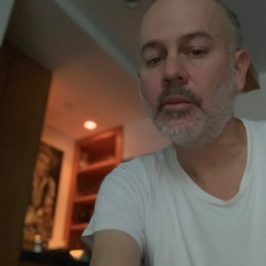Poets in genuine despair don’t write poetry. Despair is a full-time job and affords no Wordsworthian tranquility. But after you survive eye-banging the abyss you can get down to the business of writing poems that will disturb friends, family, colleagues, and editors. If those poems also impress, you might get a book deal. Then you can disturb strangers, reviewers, and academic search committees. Other parents at preschool will pretend they don’t see you walk in. The dream becomes reality.

“I know you’re perverse—you’re a poet!” Illustration by Josh Quick
But let’s step back from this jackpot scenario and look at two problems the aspiring dark poet faces on her way to isolated glory: 1) How to arrange a book of hopeless poems, and 2) How to market them. The bearable news is that because the two problems are related, so is their solution. That solution is simple: you have to determine an occasion generative for the despair expressed in the poems. You need to embrace the lie of biography, a symptom of the contemporary epidemic of Narrative—commonly expressed by the stupid question, “So what’s your story?”
Of course your poems will arise from your birth into this awful world. But the horror of existence won’t do as an organizational scheme. I would love to read that book but it won’t get published now. Rather, you must embrace the evil of narrative in order to suggest a beginning, middle, and end to your poetry collection. This requires taking anti-nausea medication, sitting down with the completed poems, and crafting a suggested journey from despair to something like redemption.
From a successful poet friend I learned that a great and wasteful way to do this is to print out all the poems on their own sheets of paper, find a hallway or room relatively free of furniture, and lay the poems out, side by side. It’s revising as God might do with His children—or Satan, as you prefer. The point is that you want to sculpt the shape of a story, a vector of viability, to mitigate the sense that you’re wildly insane.
That all narrative, because it’s crafted, is a lie shouldn’t impact these considerations. Truth and authenticity are antithetical to artistic endeavor—unless, like the Romantics, you wear them to mask your poetic exaggerations. What’s unsavory is lyric being made to capitulate to narrative, when the lyric form exists in opposition to story. A lyric poem marvels at a moment’s infinite implications; moments occur in stories merely to make us say, “Then what happens?” Or as the critic Alexander Shurbanov has it, “Poetry does not describe an event, it wants to be it (1).”
So to publish our books we must be corrupted. Stories are king. It’s a strange state of affairs because so few people buy poetry that it would seem aesthetic compromise wouldn’t be necessary, but the money required for production and marketing apparently dictates that we behave as if poetry were a capitalistic enterprise. And what if this book’s the next American Primitive or Citizen? It could happen—probably not with your sad ass poems, but still.
The macabre truth of it is that even most poetry lovers don’t know how to read anything non-narrative. Maybe we should blame the late medieval poet Petrarch, referred to variously as the Father of Humanism and the Father of the Renaissance. I prefer the Father of Thanatos. Knowingly or not, poets still toil under the influence of his sonnet-heavy lyric poem sequence the Canzoniere, which critics have traditionally interpreted as telling the story of its speaker’s lifelong unrequited love for a blond Avignon beauty named Laura (2). These poems are frequently despairing and seem to be arranged so that in the first half of the book, the poems address a living Laura who wants nothing to do with the speaker. Poems in the book’s second half seem to address Laura in death, whose passion for the speaker remains unchanged.
Petrarch is also the Father of the Foggy Barrier Between Poet and Speaker—the barely visible line between the “I” of the writer and the “I” of the voice of the poem—the permanence of which continues to bless or plague lyricists today. It’s a particularly awkward problem for the morose poet, which Petrarch himself seems to have experienced. Sometimes you’re just a guy in a room buying a bottle of olive oil.
The Canzoniere closes with Poem 366, in which the dying speaker addresses the Virgin Mother and begs her forgiveness for worshipping an earthly woman (Laura) for so long. It also strangely flirts with VM, as if she’d be flattered that Italy’s great poet of love now vowed to spend eternity making eyes at her. This poem is generally regarded as a masterpiece, I suspect in part because it satisfies many readers’ narrative desires—what began in frustrated hope and evolved into miserable resignation now becomes joyously suffused with a kind of meaning, which might be described as, “Temporary desire for mortal women is justified by its eventually leading to a fuller appreciation for and deeper love of the undying ideal Holy Mother.”
I happen to believe that frustration with this pat teleological structure partly inspired Shakespeare’s Hamlet, whose perfect nihilism has ruined it for the rest of us (3). Even if you don’t think truth, identity, and meaning exist, the structure of your book of poems needs to pretend that you do. Note that I didn’t say your poems need to pretend that meaning, truth, or identity exist—but you need to place your howls of terror in a manner that suggests they might. This practice’s absurdity is a way into perversely enjoying it, and I know you’re perverse—you’re a poet!
Here’s what I did: I led my book dead boy with (for me) an emotionally neutral poem called “How to Write a Poet’s Bio.” After that, I gradually introduced two bleak themes: the premature death of my younger brother and my subsequently self-destructive struggle to deal with it. Poems that have little or nothing to do with those two themes suddenly seem to fit, when placed next to poems about tree-shattered faces and scotch-drenched graveyard ruminations in the rain.
When I divided my book into two sections—Right Eye and Left Eye—a narrative emerged. Like the Canzoniere, I had created a kind of Brother-in-Life and Brother-in-Death division. Truth, identity, and meaning followed. Then I could write a pitch document for book publishers presenting not the poems so much as the meaning-rich narrative. I hoped the poems would take care of themselves—they’d have to, since I’d abandoned them, in a manner Valéry probably didn’t mean.
Because many people (even reviewers) don’t know the difference between poems and diary entries—and because many people (even reviewers) skim rather than read—dead boy’s narrative structure doesn’t prevent others from assuming I spend my life looking for a high place to leap from. But I know that draping my lines over story’s skeleton got it published. My family’s insulted. The Washington Post liked it. The Antioch Review was indignantly positive. Then what happens?
1. Alexander Shurbanov, Shakespeare’s Lyricized Drama, p. 21.
2. Our contemporary free-verse lyric poem is a direct descendant of the sonnets that Petrarch made so popular. Sonnets and free-verse poems are portably brief, feature a single speaker addressing a specific noun, and make “a turn” at the end.
3. I wrote my PhD dissertation about it.
